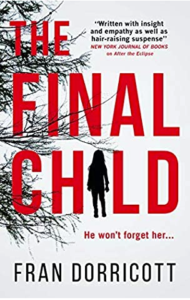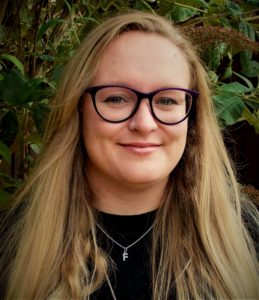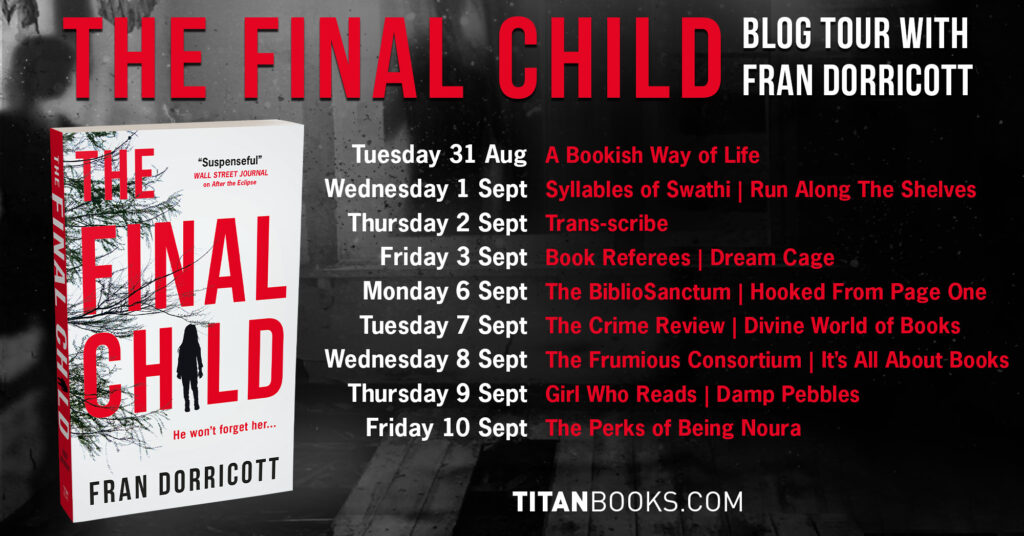Q. First off, congratulations on your second book! How was the experience of writing The Final Child different from writing your debut, After The Eclipse?
A. Thank you! Honestly, writing The Final Child was a lot of fun. To me it feels a little grittier, a little slower in terms of tempo, and I liked being able to explore the characters at a difference pace. Writing under a deadline for my second novel was an interesting experience, but I tend to draft fairly quickly so it wasn’t as hard as I thought – but revising a novel under a time pressure is always tricky so there were some elements with this second novel that I found harder. I like to think the work paid off, though!
 Q. I love that The Final Child continues to explore several of the themes from After The Eclipse, including a focus on survivors and how people cope with tragedies for which they blame themselves. How do you feel that your themes evolved from one book to the next?
Q. I love that The Final Child continues to explore several of the themes from After The Eclipse, including a focus on survivors and how people cope with tragedies for which they blame themselves. How do you feel that your themes evolved from one book to the next?
A. I love to think of After the Eclipse and The Final Child as two kind of companion novels. They’re not connected but they are sort of spiritual sisters, and I think this stems from the evolution of ideas from one novel to the next. While I was writing After the Eclipse I found myself thinking a lot about what it means to be a survivor, and how really there is no one way to process that extreme kind of trauma, so I started to think it would be worth exploring that in more detail in my next book. And as for the sibling theme, guilt and anger and loss in sibling relationships is something I often come back to because I have such a strong bond with my own sister.
Q. What motivated you to add a concrete link from The Final Child to its predecessor in the form of the (awesome) aspiring writer Harriet Murphy?
A. I think it’s just a character idea I really love! Writing is such an intrinsic part of my life that I love to include it in my work where I can, and I thought this novel would also benefit from the kind of insight that writers tend to experience. A lot of writers I know seem to have the ability to read people, to feel a strong empathy for them, but that doesn’t make us street smart and that can lead to some interesting problems for characters to unpick. It’s one of my favourite tropes in books I read too.
Q. I really enjoyed the representation in The Final Child. I know you made conscious choices regarding that in After The Eclipse, as well. With different characters at its heart, however, what were you particular about wanting to showcase in this novel?
A. I was very keen on writing another central sapphic pairing in The Final Child, partly because it’s a goal I set out with in most of my writing but also because I know that relationship meant something to some of the people who read After the Eclipse. I want the people who are looking for elements of themselves to be able to find something in my novels, and I still don’t think there are enough central sapphic pairings in literature in general (though it’s so much better than it was even just a few years ago).
Q. You’ve mentioned that After The Eclipse was partially inspired by the 2015 solar eclipse. Was there a similar genesis for The Final Child?
A. The Final Child was, in some sense, actually inspired by the experience of writing After the Eclipse. I became fascinated by the idea of sibling guilt, and more broadly survivor guilt, which is where somebody who has experienced a traumatic event feels guilty for long afterwards, even though what happened wasn’t their fault. I explored this a little with Cassie in After the Eclipse, but Erin’s story diverted when I considered how hard it would be to process your grief if both you and a sibling experienced the same terrible event, and if they didn’t make it and you did. How would that impact your confidence and your sense of self? Then I began to consider how these events effect us more broadly; we often think about immediate family, but there is not usually any mention of the more distant family members whose lives will likely be impacted in a quieter way. This is where Harriet’s story began, and the intersection between her experience and Erin’s is one of the main conflicts that drives this novel.
Q. Living as we do in interesting times, how have the broader events of the past few years affected your writing?
A. I’ve been very fortunate that I’ve not been affected as much as many people. I was furloughed from my day job as a bookseller on three separate occasions, but I have a lot of support and was able to cope with those lockdowns by reading and writing and generally trying to keep a sense of normality through my writing. It was hard, but I ended up using the time to work on a couple of other projects – and I’m especially fortunate that they have come to fruition.
Q. What can you tell us about your next project? Is your Young Adult dark fantasy still in the works?
A. Aha! So during 2020 I actually managed to secure book deals for two separate books that will be released in 2022, so I have a couple of things upcoming. I have a third crime novel called The Lighthouse, sort of a gothic suspense novel set on a remote Scottish island, releasing with Avon in February 2022, and I do actually have news on the dark fantasy, although it’s no longer classed as young adult! One of the things I did during lockdown was rewrite the manuscript with an adult focus and I’m super excited to announce that Wild and Wicked Things, my gothic sapphic witchy retelling of The Great Gatsby is due out with Orbit/Redhook in March 2022. Both are on Goodreads and already available to pre-order.
Q. What are you reading at the moment?
A. This is such a great question! Unfortunately there’s no short answer as due to getting covid a few weeks ago (while double jabbed and being super careful, might I add!) my concentration is a little shot. However I’m currently flipping between a few different titles and really enjoying them all. For non-fiction I’m reading All The Young Men by Ruth Coker Burns, which narrates Ruth’s experiences looking after AIDS and HIV patients in Arkansas during the 1980s. And then fiction-wise I’m also reading The Devil Makes Three by Tori Bovalino and The Maidens by Alex Michaelides. Both are dark academia, because autumn is such a great time for that sub-genre, but Bovalino’s is a fantastic fantasy about a demon escaping in a prep school library while the Michaelides is a crime novel about a murder at Cambridge University. I’d recommend all three!
Q. Are there any new books or authors, especially in the mystery genre, that have you excited?
A. One title I am super excited for other people to read is Five Minds by Guy Morpuss! It’s a futuristic crime novel set in a world where multiple consciousnesses can inhabit one body to live longer, and what happens when things go wrong after a dangerous offer and members of one body commune begin to disappear one by one… It’s wacky but really clever, and a lot of fun.
Q. Tell us why you love The Final Child!
A. Oh there are so many reasons I love this book, but I think I love it especially because of the relationship between Erin and Harriet, which starts off very spiky, there’s no trust there and neither particularly likes the other, and it becomes a natural evolution of trust and love. And also, I’m not going to give any spoilers but I really adore the flashbacks and the backstory element of The Final Child. The characters were some of the most interesting, and the most haunted and messed up, that I’ve ever written and I can’t wait for people to be a bit creeped out!
 Thank you so much for having this discussion with us!
Thank you so much for having this discussion with us!
Thank you for having me!
~~~
Author Links
~~~
The Final Child was published September 7 2021 by Titan Books and is available from all good booksellers including

